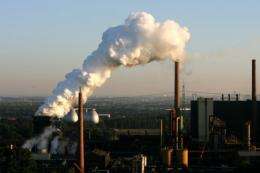German cabinet approves CO2 storage bill

Germany's cabinet approved a draft law on storing carbon dioxide underground on Wednesday after months of debate as Europe's top economy wrangles over energy policy following Japan's nuclear disaster.
"Recent developments have again brought home to us the efforts we need to make to ensure power generation is sustainable, climate-friendly, safe and economically viable," Economy Minister Rainer Bruederle said.
"I am convinced that CCS (carbon capture and storage) opens up important opportunities, both for the continued use of fossil fuels and to reduce CO2 emissions."
The bill, which needs parliamentary approval and which implements a directive from the European Union, allows pilot and demonstration projects to go ahead ahead of an assessment of its viability in 2017, the government said.
It follows however months of debate with the governments of Germany's 16 states, and includes a clause giving them the say on where the storage sites are located.
It also comes as Chancellor Angela Merkel's government looks to speed up the transition to renewable energy sources after the crisis at Japan's Fukushima nuclear plant following the March 11 earthquake and tsunami.
Merkel announced a few days later a three-month suspension of an earlier decision to extend the life of Germany's nuclear plants and the temporary shutdown of the country's seven oldest reactors pending a safety review.
Germany decided a decade ago to abandon nuclear power by around 2020 but Merkel last year postponed this by more than a decade, saying alternative sources of energy were not yet ready to fill the gap.
The country's 17 reactors produce around a third of its electricity. Fossil fuels provide around half of its energy needs and several new coal plants are either in construction or planned.
CCS aims to snare CO2 as it is pumped out from fossil-fuel burning plants, liquefy it and bury it underground, usually in disused natural gas storage chambers, to stop it escaping into the atmosphere and causing climate change.
It is also seen as a way of buying time for politicians to forge an effective treaty on greenhouse gases and wean the global economy off cheap but dirty fossil fuels.
Other major emitters including the United States, China and Australia see CCS as crucial and countries have earmarked tens of billions of dollars to develop a technology that is still only at an experimental stage.
But critics say CCS could be dangerous and that the large amount of investment needed would be better spent on renewable sources of energy, like solar and wind power, or on nuclear power.
(c) 2011 AFP




















